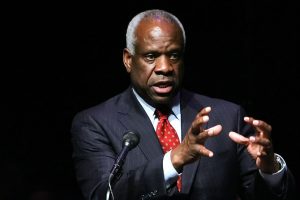(Akiit.com) There was an especially telling moment in Supreme Court Justice Clarence Thomas’s brief Q and A with C-Span in April, 2013. The question was what he thought about President Obama. Thomas first gave a pithy put-down of Obama and then admitted that he had practically no interaction with him. But then he sternly said that he, Thomas, was a black man who did not say the “prescribed things” and that he’d be “picked apart” for it.
He has been and he’s done everything humanly and legally possible to get his revenge for being picked at. The latest in the long trail of Thomas paybacks was his sole dissenting vote against scrapping the death penalty verdict for Timothy Tyrone Foster, an African-American, in a rape and murder case in Georgia. Georgia prosecutors were outrageously blatant in dumping any African-American from the jury in the case. They went so far as to put racial  designations—“B#1, B#2, and B#3”—beside the prospective black juror’s names and then summarily booting them.
designations—“B#1, B#2, and B#3”—beside the prospective black juror’s names and then summarily booting them.
This was too much stomach for Justice John Roberts, and the other two staunch conservatives on the bench. They quickly tossed the verdict, reminding Georgia and all that picking juries by race is a firmly established legal and constitutional no-no. But not Thomas, he didn’t see or hear any evil in the patently illegal shenanigans of Georgia prosecutors.
So one can say what they want about Thomas but with his latest judicial insult, he’s been a man of his word. Since that fateful day in 1991 when a deeply divided and even more deeply reluctant Senate confirmed him to the high court, Thomas vowed payback against those who ridiculed, reviled, and hounded him during the confirmation fight, and have relentlessly lambasted him since then. He’s been on an unholy crusade to wreak revenge for that humiliation. When the issue is anything that even faintly smacks of race, be it voting rights, housing or job discrimination, and his favorite, crime and punishment, especially the death penalty, and the aggrieved is an African-American, Thomas never disappoints. He will vote to burn him.
Thomas’s latest ridiculous dissenting vote, like his other just as ridiculous lone wolf votes on race based court cases, make absolutely no sense to most legal experts. But they’re not about law. His decisions make sense because they have less to do with his warped interpretation of law and its practice than with his publicly expressed racial views, and his private vow to get revenge.
When asked some years ago how long he’d stay on the court, he reportedly said that he’d stay there for next 43 years of his life. He was 43 at the time. In a more revealing aside, he supposedly quipped to friends that it would take him that long to get even. Whether that is hyperbole or an apocryphal tale, it hasn’t taken him 43 years to wreak his revenge.
The dissent in the Foster case is more than ample proof that Thomas has been a one man wrecking crew on race in law and public policy decisions. But this is not simply one man’s personal bitterness over his alleged mistreatment by liberals and civil rights leaders. Nor is it a case of his digging in his heels to push his retrograde view on racial matters. He wants more judges to think and act like him on the bench. And all the better if those strict racial constructionist judges happen to be minorities.
In his 2007 autobiography, My Grandfather’s Son, the bitter grudge that he holds against those who did so much to dump his confirmation were on naked and brutal display. He showed no sign of budging a step from the never-ending public and private war he’s waged against civil rights leaders and liberal Democrats. He branded them the “liberal mob” and gripped that they had one goal, and only one goal, and that is to “keep the black man in his place.” The black man of course is Thomas.
The other theme that courses through Thomas’s clinical need for payback is his obsessive view of himself as the perennial martyr. In an American Enterprise Institute lecture in 2001, he wrapped himself in the martyr’s garment and said that he expected to be treated badly for challenging liberal opinion. A decade later in a talk to the ultra-conservative Federalist Society, he vented that persecution complex again when he said that unnamed critics “seem bent on undermining” the Supreme Court. He meant one justice on the court, himself.
Thomas’s mean-spirited and vindictive views and legal opinions on the death penalty, age and gender bias, first amendment, prisoner rights and affirmative action cases were well known by the time he hit the court in 1991. It could hardly be said even then that he latched on to judicial conservatism solely to curry favor with white conservatives to snatch a seat on the high court. He actually believes what he says and writes in his nutty on man dissents even when others ridicule him mercilessly and deservedly for them. And he could care less, it’s just Thomas continuing his big payback.
Columnist; Earl Ofari Hutchinson
Official website; http://twitter.com/earlhutchins









Leave a Reply